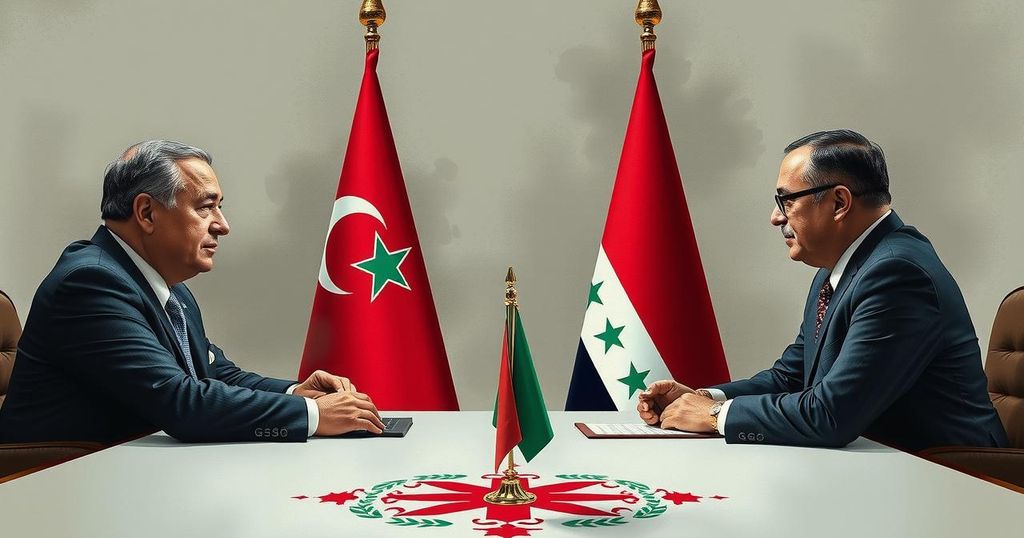Nations around the globe are enhancing diplomatic engagement with Syria’s interim rulers following the ousting of President Bashar al-Assad by Islamist-led rebels. This shift has prompted significant internal and external changes, with countries like Qatar and Turkey re-establishing ties and promising support. UN officials emphasize the need for justice and inclusive governance while humanitarian needs remain urgent. Amid a cautious optimism, major challenges pertaining to reconstruction and minority rights persist as Syria transitions from a decade-long civil war.
Following the recent ousting of President Bashar al-Assad by Islamist-led rebels, international governments are intensifying their diplomatic outreach to the interim rulers of Syria. This abrupt change in leadership has sparked widespread celebrations among the populace, as many citizens express a newfound sense of liberation. However, the swift invasion that resulted in the capture of Damascus on December 8 has also left various nations re-evaluating their strategies regarding Syria, particularly in light of the role played by Hayat Tahrir Al Sham (HTS), an extremist faction with ties to Al-Qaeda, which remains classified as a terrorist organization by multiple Western nations.
UN envoy Geir Pedersen has emphasized the importance of establishing a just and inclusive governance framework while urging accountability for past crimes. He recently met with HTS leadership, advocating for a credible legal system that can uphold the rule of law without resorting to vengeance. Concurrently, a Qatari delegation has pledged its commitment to support the Syrian people, coinciding with the reopening of its embassy—a significant diplomatic gesture after years of severed ties following the onset of civil unrest.
In tandem with Qatar, Turkey has also stepped forward, re-establishing its embassy in Damascus and offering military assistance to the newly formed government. Countries such as the United Kingdom and the United States have confirmed channels of communication with HTS, despite their designation as a terrorist group, in recognition of the urgent humanitarian needs in the region. French diplomats are reportedly set to engage with new authorities to assess immediate humanitarian requirements.
While the civil war has left tragic scars—over 500,000 lives lost and half the population displaced—the departure of Assad has offered a glimmer of hope for many Syrians. Reports of prison releases highlight the grievous experiences endured by detainees under Assad’s regime. Amid these changes, citizens are cautiously optimistic, returning to normalcy, with children resuming their education after months of disruption.
Despite the enthusiasm in the streets, experts and local leaders acknowledge the significant challenges ahead, particularly rebuilding the shattered institutional frameworks and addressing the country’s dire economic situation. HTS’s rise to power raises concerns about the treatment of minorities, although some communities express a sense of security in the interim government’s promises to uphold citizens’ rights. The international community continues to monitor unfolding developments closely, with Israel maintaining a vigilant stance in the region as tensions between neighboring states persist.
The backdrop of this report involves the recent overthrow of Bashar al-Assad’s regime by Islamist-led factions, marking a significant shift in the Syrian political landscape after over a decade of civil war. The conflict has resulted in unprecedented humanitarian crises, with immense casualties and displacement. The interim government formed in the wake of Assad’s ousting brings both excitement and apprehension among Syrians and the international community alike, particularly due to the influence of HTS, which holds a controversial reputation. As countries explore re-engagement with Syria, crucial matters of justice, aid, and stability loom large, demanding careful navigation in this new chapter for the nation.
In summary, the recent power shift in Syria following the ousting of Bashar al-Assad has elicited varied responses from the international community, who are now engaging with the new interim rulers. While there is a palpable sense of hope among many Syrians, challenges related to governance, restoration, and the protection of minority rights remain significant hurdles. The global response illustrates a delicate balance between providing humanitarian support and addressing the complexities of aligning with a government linked to a group deemed extremist. The upcoming weeks will be pivotal in determining Syria’s path toward recovery and stability in a post-Assad era.
Original Source: jordantimes.com






